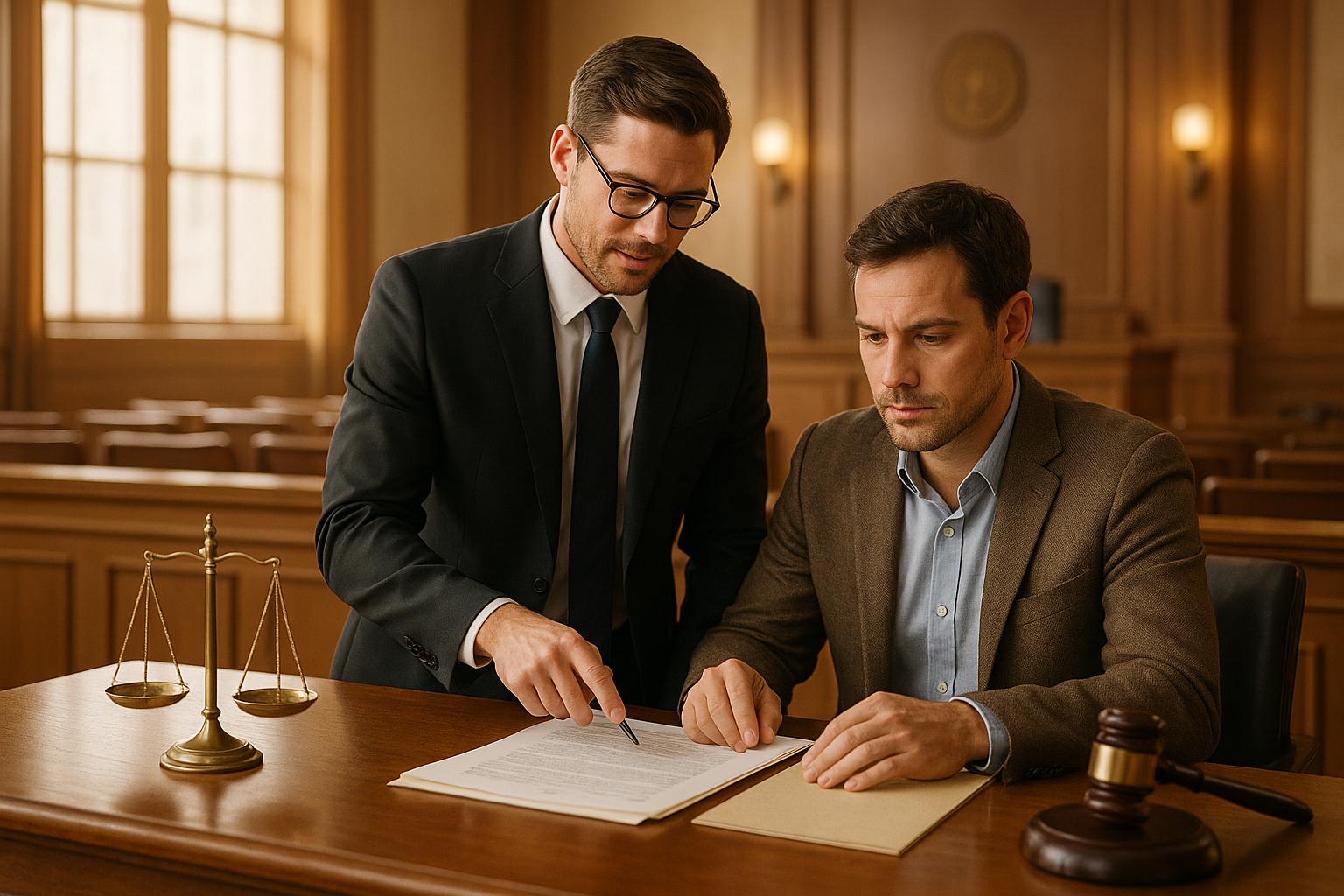How hard is it to win a personal injury lawsuit?
Story by Joel Berly
August 1, 2025

Winning a personal injury lawsuit can be challenging but not impossible. Here’s the gist:
- Most cases settle: Over 95% of personal injury claims are resolved through settlements, avoiding the unpredictability of trials.
- Proving fault is key: You must show the other party’s negligence caused your injuries and justify the compensation you’re seeking.
- South Carolina’s 51% rule: You can only recover damages if you’re 50% or less at fault. Your compensation is reduced by your percentage of fault.
- Insurance challenges: Insurers often try to minimize payouts using tactics like low offers or delays.
- Success rates vary by case type:
- Motor vehicle accident trials: 61% win rate
- Slip-and-fall cases: 39% win rate
- Product liability cases: 38% win rate
- Medical malpractice: 19% win rate
Acting quickly, gathering strong evidence, and working with a skilled attorney significantly improve your chances of success.
Main Challenges in Winning a Personal Injury Case
Pursuing a personal injury case can be challenging, with legal and procedural hurdles at every turn. Being aware of these obstacles can help you prepare and strengthen your case.
Proving Fault and Causation
In South Carolina, the burden of proof lies with you, meaning you must demonstrate that the defendant owed you a duty of care, breached that duty, and directly caused your injuries. This can get tricky, especially when multiple factors contributed to the accident or when symptoms appear long after the incident.
To build a solid case, gather as much evidence as possible. This includes photographs, medical records, accident reports, and witness statements. In many cases, expert testimony becomes crucial. For example, accident reconstruction specialists can clarify how the incident occurred, while medical professionals can connect your injuries to the defendant’s actions. South Carolina law requires you to establish six key points: how the injury happened, who was at fault, the nature of your injuries, the treatment you received, any ongoing issues, and how the incident has impacted your life.
Fault determination becomes even more complex under South Carolina’s negligence laws.
How South Carolina’s Comparative Negligence Laws Work
South Carolina follows a modified comparative negligence system, often referred to as the "51% rule." Under this rule, you can recover damages only if you are 50% or less at fault for the incident. If your share of fault reaches 51% or higher, you cannot recover any compensation. Additionally, any damages awarded will be reduced by your percentage of fault.
Several factors come into play when determining fault, such as traffic laws, police reports, witness statements, expert testimony, and physical evidence. This system affects a wide range of cases, including car accidents, slip-and-fall incidents, workplace injuries, pedestrian and bicycle accidents, and medical malpractice claims.
Proving fault is just one part of the battle – dealing with insurance companies is another significant challenge.
Handling Insurance Companies and Their Defense Strategies
Insurance companies are not on your side. Their primary goal is to minimize payouts, often by devaluing or outright denying claims. Adjusters may approach you quickly, adopting a friendly demeanor to gather information they can later use against you.
Some common tactics include asking for recorded statements, requesting overly broad medical authorizations, offering lowball settlements before you fully understand the extent of your injuries, disputing medical bills, and delaying the process to pressure you into accepting less than you deserve. In some cases, adjusters might even suggest you don’t need an attorney, hoping to discourage you from seeking legal representation.
To protect yourself, avoid giving recorded statements without consulting a personal injury attorney. Decline to sign broad medical authorizations, and don’t rush to accept early settlement offers before fully understanding the scope of your damages. Keep detailed records of all interactions and seek independent legal advice to ensure your rights are safeguarded.
The Legal Process for Personal Injury Cases in South Carolina
Navigating a personal injury lawsuit in South Carolina involves a series of steps, each with specific requirements and deadlines.
Filing Your Claim and Collecting Evidence
Timing is everything when filing a lawsuit. According to South Carolina Code §15-3-530, you have three years from the date of your injury to file a claim. For wrongful death cases, the clock starts ticking from the date of death. If your claim involves a government entity, the deadline is much shorter – typically just one year. Missing these deadlines can result in your case being dismissed, leaving you with no legal options. In rare situations, exceptions like tolling may apply.
Strong evidence is the backbone of any personal injury case, especially given the high accident rates in the state. To prove liability and counter insurance company tactics, gather as much relevant evidence as possible.
- Medical records: Include ER reports, diagnostic tests, prescriptions, and therapy notes to establish a direct link between your injuries and the accident.
- Visual proof: Photos and videos of the accident scene, vehicle damage, injuries, and any available surveillance footage can be incredibly persuasive.
- Witness statements: Collect contact information from witnesses and secure written or recorded statements promptly. Police and accident reports also provide objective accounts of the incident, including officer observations and preliminary fault assessments.
- Financial records: Use pay stubs and employer letters to document lost wages or reduced earning capacity. Additionally, keeping a detailed journal of your pain, symptoms, and emotional struggles can strengthen your claim.
Once you’ve built a solid foundation of evidence, the next step is settlement negotiations.
Settlement Talks and Negotiations
In South Carolina, most personal injury cases are resolved through settlements rather than going to trial. Settlements aim to compensate you for medical expenses, lost income, and pain and suffering while avoiding the cost and uncertainty of a courtroom battle.
Negotiations often highlight the strengths and weaknesses of each side’s case. These discussions can continue even after a trial date is set or during the trial itself.
Preparation is key. Have a minimum settlement figure in mind, but remain open to adjustments as new information emerges. If the insurance adjuster offers a low initial amount, ask for justification and emphasize how your injuries have impacted your daily life.
Having an attorney ready to take your case to trial can also work in your favor. Insurance companies are more likely to take settlement discussions seriously when they know litigation is a real possibility.
If negotiations fail, the case moves to trial.
Going to Trial and Court Preparation
Taking your case to trial can significantly extend the timeline of your lawsuit.
The process begins with discovery, where both sides gather detailed information about the case. You may need to give a deposition, providing sworn testimony about the accident, your injuries, and how they’ve affected your life.
Your attorney will also collect witness testimony and key documents to build a compelling case. Expert witnesses often play a critical role during trial. For instance:
- Medical experts can explain the long-term effects of your injuries.
- Accident reconstruction specialists can analyze how the crash occurred.
- Vocational experts can outline how your injuries impact your ability to work.
Pretrial motions may be filed to address legal questions or exclude certain evidence before the trial starts. Mediation is another option, where a neutral third party helps both sides work toward a resolution. Many courts encourage or even require mediation before trial to streamline the process.
Every step of the legal process requires meticulous attention to detail and strict adherence to deadlines. Early preparation and professional legal guidance are essential for navigating these challenges effectively.
sbb-itb-7016c6e
How to Improve Your Chances of Winning
After an accident, the decisions you make in the immediate aftermath can significantly affect your ability to secure fair compensation. Quick and informed actions can help you navigate the legal process more effectively. Here’s a breakdown of the essential steps to strengthen your claim.
Getting Medical Care Right Away and Keeping Records
Your health should always be the top priority. After an accident, even if you feel fine, it’s critical to seek medical care immediately. Injuries might not be obvious right away due to shock or adrenaline, but a visit to the emergency room or your doctor can uncover hidden issues. Medical evaluations also create a documented timeline of your injuries, which is important for your case.
Keep detailed records of everything related to your treatment. This includes medical bills, diagnostic tests, prescription receipts, and notes from your doctor. These documents not only help track your recovery but also serve as evidence to support your claim.
Once your medical needs are addressed, the next step is to consult a legal professional.
Working with a Personal Injury Lawyer
Hiring an experienced personal injury attorney can make a significant difference in the outcome of your case. Studies show that individuals represented by lawyers often receive higher compensation. A skilled attorney can handle the legal complexities, from paperwork to understanding South Carolina’s specific laws, such as statutes of limitations and liability rules.
"Personal injury attorneys are skilled negotiators who can effectively advocate for your rights and interests. They know how to counter the tactics used by insurance companies and fight for a fair settlement on your behalf." – Hodge Law Firm
Beyond legal expertise, attorneys often have access to resources that can strengthen your claim. This includes medical experts, accident reconstruction specialists, and investigators who can provide valuable insights. Many personal injury lawyers work on a contingency-fee basis, meaning you only pay if they win your case. With their guidance, you can focus on recovery while they handle the legal process.
Meeting Deadlines and Acting Quickly
Timing is everything when it comes to personal injury claims. In South Carolina, you generally have three years from the date of the injury to file a lawsuit. Acting promptly helps preserve critical evidence – memories fade, documents can get lost, and physical evidence might change or disappear over time.
Start documenting your case as soon as possible. Take photos and videos of the accident scene, including any hazards. Safeguard physical evidence and label it with the date and context. Organize all related paperwork – medical records, bills, and any correspondence with insurance companies – in one place to ensure nothing is overlooked.
"In personal injury cases, evidence is the cornerstone." – Daly & Black, P.C. Law Firm
Every day you delay could weaken your case. Acting quickly not only helps preserve evidence but also ensures you meet all legal deadlines, giving you the best chance to protect your rights and secure fair compensation.
Is Winning a Personal Injury Lawsuit Hard?
Winning a personal injury lawsuit can feel like navigating a maze, with the outcome heavily dependent on the specifics of your case, the strength of your evidence, and your ability to maneuver through the legal process.
In South Carolina, plaintiffs must prove their case by a "preponderance of the evidence." This standard generally works in favor of the plaintiff, as it only requires showing that something is more likely true than not. However, the state’s comparative negligence rules can complicate matters. If you’re found partially at fault for the incident, your compensation may be reduced accordingly.
Insurance companies often make things trickier. They might delay claims, demand excessive paperwork, or downplay the severity of injuries – even in cases that seem straightforward at first glance.
Strong evidence remains your best ally. Detailed medical records, clear and credible witness testimony, and other solid documentation can greatly improve your chances. Most personal injury cases settle before reaching trial, but the final settlement amount often hinges on the strength of your case and the negotiation process.
Some cases come with unique challenges. For instance, medical malpractice claims usually require expert testimony to prove negligence. Similarly, claims against government entities are subject to strict rules and a $300,000 cap on damages for individual claims.
Acting quickly after an accident can make a big difference. Seeking immediate medical care, keeping thorough records, and working closely with an experienced attorney are all crucial steps. Even cases that seem overwhelming at first can be resolved successfully with the right approach and preparation. Understanding these obstacles highlights the importance of timely action and skilled legal guidance.
FAQs
What can I do to improve my chances of winning a personal injury case?
To boost your chances of success in a personal injury case, the first step is to gather solid evidence as quickly as possible. This means taking photos of the accident scene, collecting medical records, and obtaining witness statements. The more detailed and clear your documentation, the stronger your claim will be.
Another key move is hiring an experienced personal injury lawyer. An attorney with expertise in this area knows how to navigate the legal system, negotiate effectively with insurance companies, and help you manage the complexities of your case. On top of that, make sure to keep track of every expense and loss tied to your injury – medical bills, lost wages, property damage, and more. These records paint a full picture of your damages and help support your request for fair compensation.
By acting promptly and staying organized, you can greatly improve your case and work toward a successful resolution.
How does South Carolina’s modified comparative negligence rule impact personal injury cases?
South Carolina uses a modified comparative negligence system, which plays a critical role in personal injury cases. According to this rule, you can only receive compensation if your share of fault in the accident is 50% or less. If you’re found to be 51% or more at fault, you won’t be eligible for any damages.
For those partially at fault but still within the 50% limit, the amount of compensation is adjusted based on the degree of fault. For instance, if you’re awarded $100,000 in damages but determined to be 20% at fault, your compensation will be reduced by 20%, leaving you with $80,000. This approach ensures that responsibility is allocated fairly based on each party’s role in the accident.
What tactics do insurance companies use to reduce payouts in personal injury cases, and how can I protect myself?
Insurance companies have a knack for using tactics that can limit what they pay out. For instance, they might offer low settlement amounts early on, hoping you’ll accept before you fully grasp the extent of your injuries or expenses. They could also try to dispute liability by shifting the blame onto you or downplay the seriousness of your injuries to cut the value of your claim. These strategies are all about protecting their bottom line – often at your expense.
To safeguard your rights, steer clear of accepting quick settlement offers without a clear understanding of your long-term medical and financial needs. Build a strong case by collecting solid evidence, like medical records, accident reports, and witness statements. And above all, consult a seasoned personal injury attorney. They can push back against these tactics, negotiate on your behalf, and help you secure the compensation you’re entitled to.
Related posts
Categories: Uncategorized



